A night inside a strip club near Ukraine’s front lines
- Oops!Something went wrong.Please try again later.
As the dancers make their way to rehearsal, air-raid sirens blare throughout Kharkiv. When the city first came under siege, the alarms would have sent them rushing to the nearest underground shelter, where they'd wait out the shelling. Now, more than 500 days later, the dancers have learned to ignore the sirens. The wails have become part of their soundtrack as they prepare for showtime in Ukraine's easternmost major city, only 15 miles from the Russian border.
By mid-afternoon, nine women have gathered around the dance pole at Flash Dancers, the only women-owned exotic dance club in Kharkiv. Prostitution is illegal in Ukraine, putting strip clubs in a legal gray area. But the law was seldom enforced even before the war — the country boasted one of the most thriving sex-tourism scenes in Eastern Europe, with an estimated 80,000 sex workers in 2016. Today, with Kharkiv's police preoccupied with defending the city from Russian saboteurs and helping with the fallout of missile strikes, Ukrainians seem to accept that a modicum of vice might need to be tolerated, or even embraced, amid the grinding austerity of war. "Our goal is to be a switch from what is happening," says Valeriya Zavadskaya, the club's 24-year-old co-owner.
Under the club's dim red lighting, Valeriya leads the dancers through a rehearsal as Christina Aguilera's "Express" blares over the PA:
E-X-P-R-E-S-S
Love, sex
Ladies, no regrets
"One, two, go backwards," Valeriya orders. "Take two steps and then do bam! bam! bam!" With her arms stretched behind her head, she demonstrates the move, lifting herself upside down onto the pole, splitting her legs, spinning in midair, and landing on beat.
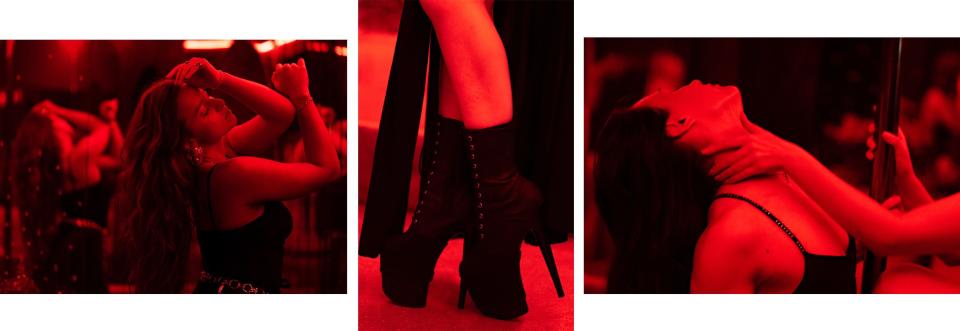
One dancer looks stupefied. She tries the move but barely gets airborne before stumbling. "I won't do that," she says.
"Yes, you will!" says Valeriya, demonstrating again. Over the next two hours, with indefatigable drill-sergeant precision, she works the dancers through each pop and pirouette of the routine, as Aguilera's power ballad plays on a seemingly endless loop:
All ladies confident, flaunt it
Boys throw it up if you want it
Can you feel me? Can it feel it? It's Burlesque
Valeriya shouts the last line as she navigates the dancers through the song, changing "burlesque" to "Flash Dance." That's the name Valeriya's mother, a former professional Soviet dancer, gave the club when she opened it a decade ago. ("Express," a song from the movie "Burlesque," in which Cher plays a nightclub owner and mother figure to Aguilera's character, is a wink to their mother-daughter proprietorship.)

The signs of war are everywhere. The windows on the three floors above the club remain boarded up after an explosion last year in the center of Kharkiv shattered every window on the block. Because Flash Dancers is in the basement, it doubles as an air-raid shelter, where staff members and tenants living above the club can wait out rocket strikes in the red-leather booths surrounding the dance pole. The club has lost three employees to the war, two of them a married couple who met there. More than a million residents have fled Kharkiv, and few who remain can afford to spend an evening at Flash Dancers, where a drink costs three times what it did before the war. There are never more than 20 guests. On some nights, no one shows up.
Yet despite a strict 11 p.m. curfew mandated by President Volodymyr Zelenskyy, the club remains open seven nights a week. At this point it's not a living, it's a lifeline — part of a nationwide, defiant attempt at normality in the midst of war. As Valeriya leads the dancers to the dressing room to change into the night's costumes, she talks about why she fell in love with the world of dance her mother introduced her to. It also sums up what the club strives to offer beleaguered patrons and employees alike.
"It's something you can't say with words," she says, "but can tell with your body."
A few hours before rehearsal, I meet with Valeriya's mother, Valeriia Kseniya, in her office at her day job, as director of a small hotel a short drive from the club. "For most of us in Ukraine today, it's difficult to earn a living in just one job," she says. We sit on the couch as she displays pictures from her life in show business — dancing with a chimpanzee in her days with a Chinese circus group, sauntering at a cabaret in South Korea. Every few minutes we can hear the lull of a train carrying soldiers and civilians passing through the railway station next door.
Growing up in Kharkiv under Soviet rule, Kseniya found herself "irritated by reality." She worked as a gymnast for the Komsomol, the communist youth league, and tried to focus on the joy of performance and ignoring the Communist Party. By the time the Iron Curtain fell and Ukraine gained its independence in 1991, she was 23. For much of the next two decades she was frequently on the road: dancing in clubs in Bulgaria and the former Yugoslavia, modeling lingerie in Italy, touring with ballet troupes in Asia.
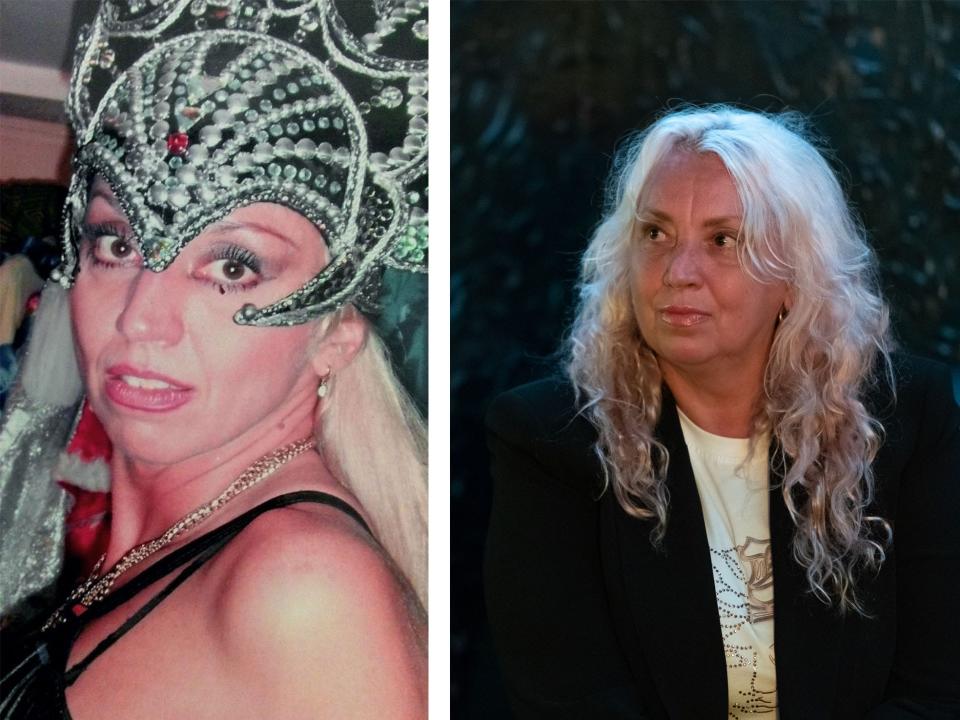
By 2014, with a teenager and a toddler in tow (she also had a grown son, who works in Ukraine's energy sector and was then 23), Kseniya decided to settle in Kharkiv. That spring, Russia annexed Ukraine's Crimean peninsula and orchestrated a rebellion of its Donbas region, plunging Ukraine into a recession. Inflation approached 30%, while unemployment climbed to nearly 11%. But for Kseniya, the timing was fortuitous. A strip club in the center of the city was going out of business. Here was her chance, she thought, to bring the world of dance home.
With visions of building a modern-day Moulin Rouge, the legendary 19th-century Parisian cabaret, Kseniya hired a handful of attractive women who knew how to dance, and then began choreographing elaborate, acrobatic numbers set to American and Europop songs. The police were suspicious: In the club's first year, they showed up multiple times to question her and the dancers about whether Flash Dancers was a front for a prostitution ring. Patrons expecting strip-club fare, meanwhile, were flummoxed by the unusual customer experience.
"Everyone initially thought it was a club with happy endings," says Kseniya, now 55. The choreography looks more like that of a modern dance company than the Hustler Club, the dancers do not get topless, and sex with customers is strictly forbidden. "Our position is that girls are not meat," Kseniya says. "Girls are about aesthetics, about femininity, about beauty."
Eventually, the club built a reputation for its performances — several pre-2022 Google reviews appear to be from women who took their husbands to the show ("wonderful, soulful atmosphere!" one wrote) — and the business grew. In 2020, needing a business partner she could trust, Kseniya brought on Valeriya as co-owner. Then early in her studies at the National University of Kharkiv, Valeriya was majoring in dance and law. ("Dance is for your soul," she explains. "Law is forever.") She took on an after-hours leadership role at the club, choreographing new numbers, helping manage the books, and running the club's Instagram and TikTok feeds.
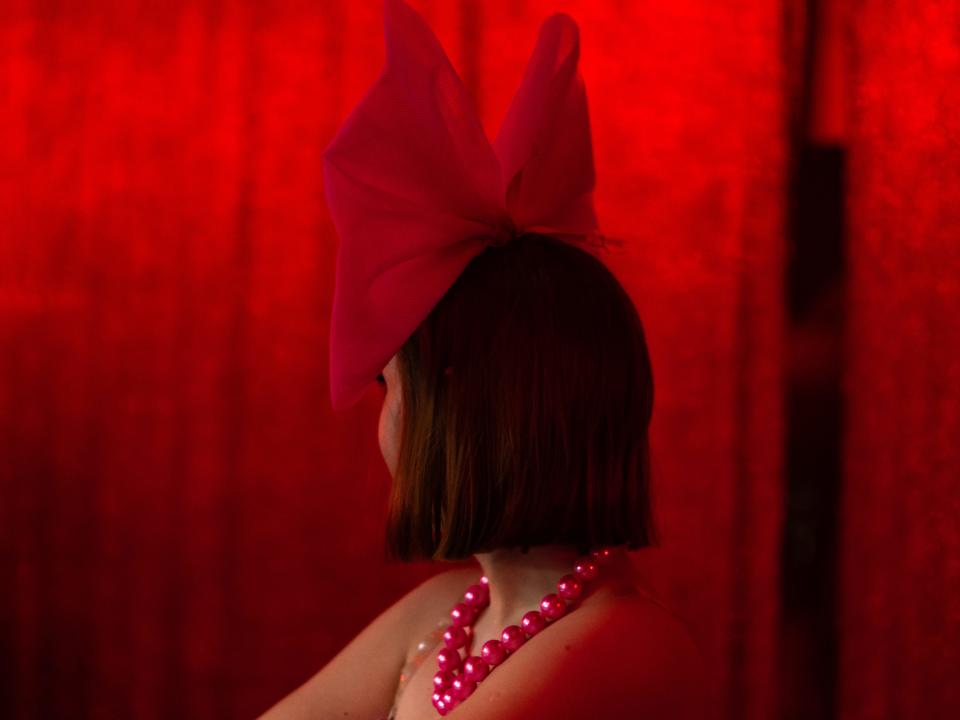
Then came Russia's full-scale invasion of Ukraine. Kharkiv immediately became a brutal battleground, battered by relentless shelling and cluster bombs. On the day of the invasion — February 24, 2022 — Kseniya and Valeriya reached all 20 dancers. Many were already fleeing. Most would not return.
With the city under siege, Kseniya continued working at the hotel to help lodge civilians who were waiting in huge numbers to leave the train station. In the first two weeks, some 600,000 people, more than a third of the city, left by rail alone. On March 8, after Russian fighter jets bombed several nearby homes, Kseniya joined the exodus. She and her daughters — accompanied by Valeriya's lapdogs, Sara and Lady — journeyed 15 hours by train to Drohobych, near the Polish border. There, they waited to see whether they would one day have a home to return to.
In May 2022, after nearly three months of fighting, Ukrainian troops pushed Russian forces away from Kharkiv. Valeriya and her family returned to find parts of their city unrecognizable, and the rubble-strewn streets quiet. Rocket strikes and shelling had damaged or destroyed apartment complexes, government buildings, churches, an opera house, a concert hall, and an economic building at the university where Valeriya was finishing her degree. The stone walls of the Flash Dancers facade were pockmarked with shrapnel. More than 600 civilians were thought to have been killed in the Kharkiv region.
Nearly half of all businesses in Ukraine shut down, and 90% of Ukrainians were facing poverty. But Kseniya refused to let Flash Dancers sit empty. She decided to reopen it with the cash she had left from the club's earlier success. And once again, she found herself grimly fortunate. Though she and Valeriya had to replace almost all of the club's staff, many women who had been working at local restaurants and strip clubs were now looking for jobs. "Everything was closed, and people began to come to us," Valeriya said. Few of them, however, had ever danced.
Now, in the afternoon before the club opens, Valeriya cleans the toilet, calls the plumber to fix a leak, and makes sure the bar is stocked and the prices are set for the evening. With inflation, liquor costs up to three times what it did before Russia's full-scale invasion. "We have a huge markup on everything," says Valeriya.
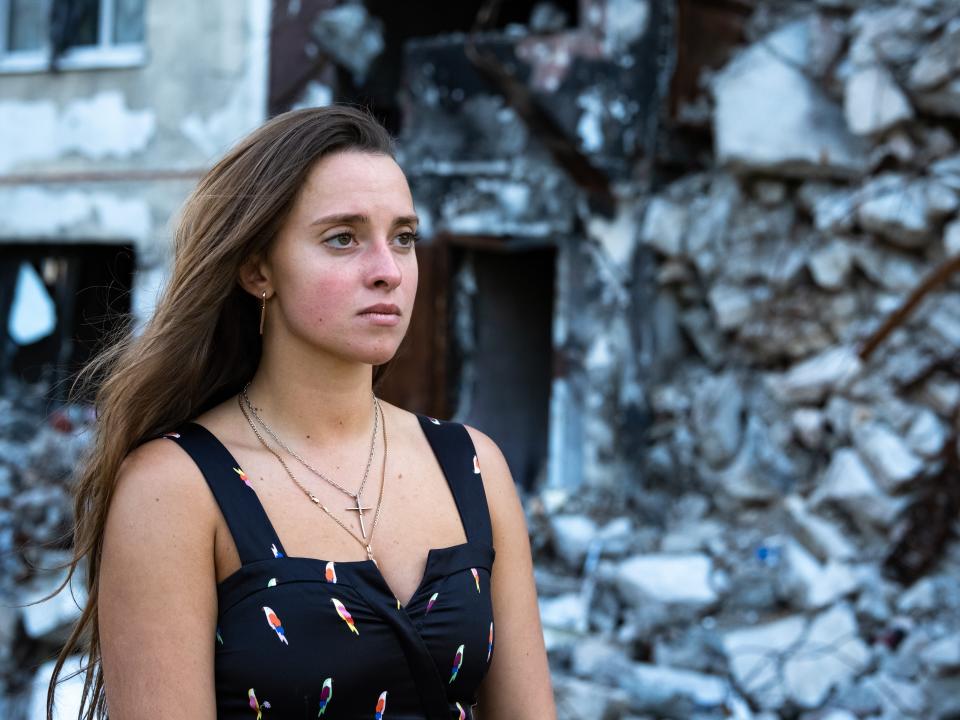
Thirty minutes before the club opens for the evening, the dancers are gathered in the dressing room. Some are putting on their makeup; others shimmy into a wide array of erotic costumes: a maid's outfit, a police uniform, frilly French cancan skirts, a black sequined ball gown. The mood is buoyant. It all feels very far from the war-ravaged streets aboveground.
I sit next to Dana, a 23-year-old Kharkiv native who asked that Insider use only her first name to protect her privacy, as she slips into a pair of white-feathered angel wings. Before the war, she worked at a strip club in the city. Now, she feels relieved to be working in a club owned by women — one that isn't a place "where everyone tries to touch you." Flash Dancers is different, attempting to strike a balance between art and entertainment.
"I'm not ashamed of it," Dana says. "I can tell people I work in cabaret."
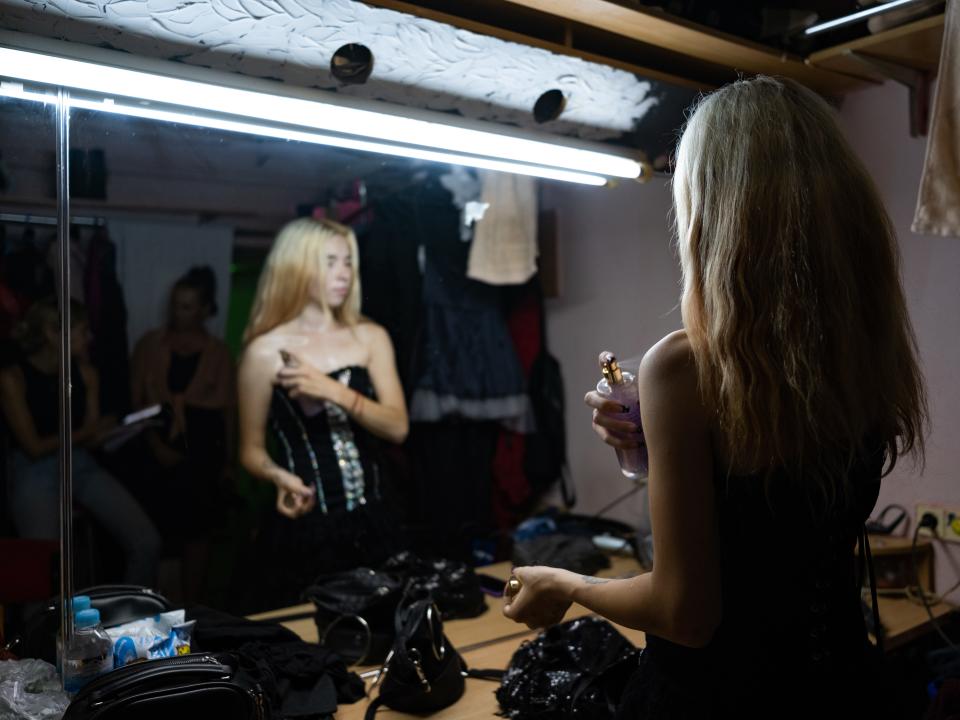
When Dana first joined Flash Dancers, Valeriya said, she was shy, silent, and not open to speaking with the team. For many of the new, wartime employees, the challenge hasn't been just the difficulty of the routines. It's a lack of confidence and self-esteem. "They don't believe in themselves," Kseniya says. Part of that, she believes, stems from a lack of positive feedback growing up — "complications that were given to them by their parents as part of the USSR heritage." But part of it comes from the ongoing fear and uncertainty created by the war. Valeriya and her mother both make a point of complimenting the dancers frequently. Kseniya does their makeup, and Valeriya makes and tailors their outfits, so the exact fit "helps their confidence."
Still, setting aside the traumas of war while they're at work is a daily battle for everyone at Flash Dancers. "You have to smile when you don't want to," Valeriya says while inspecting a dancer's mascara. "You have to entertain when you don't want to." Gyrating to the Pussycat Dolls in pumps and a sheer pearl-sequined leotard while your country is under attack doesn't come naturally to anyone. Valeriya often reminds the dancers that their customers — many of them Ukrainian soldiers — are in dire need of a distraction. Making sure "they leave with positive emotions" is good for the cause — and for tips.
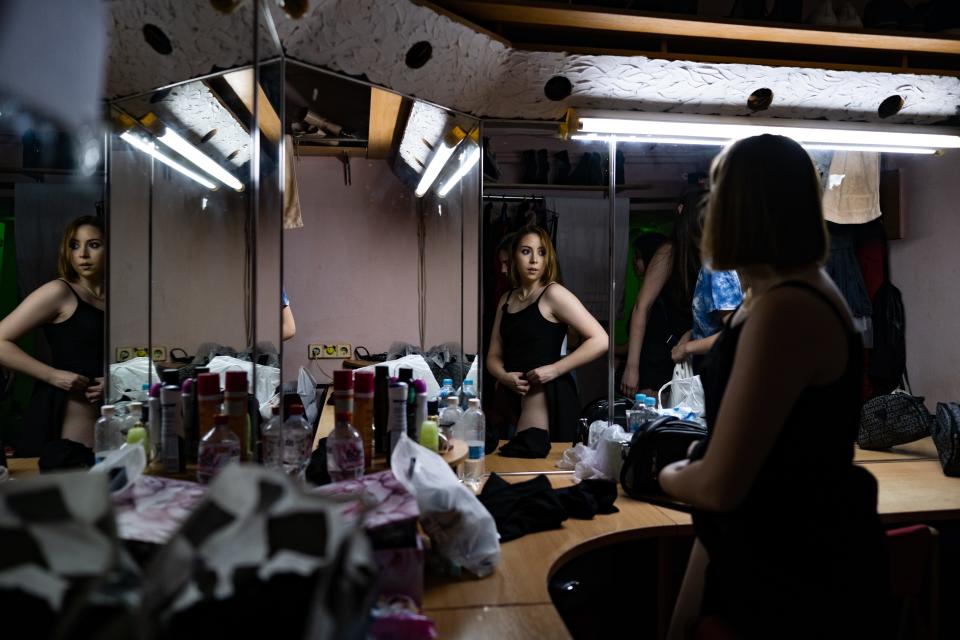
"When the military comes in, they're so tense," Kseniya says. "It's really, really tough."
Occasionally they have to toss out an unruly man. But most are cordial. Many of the soldiers ask the dancers to sit with them, and the night becomes more group therapy than cabaret. They talk about their children and wives who have fled the city, the lives they've left behind, their own floundering businesses, what they've seen on the battlefield. Dancers sometimes get more tips from listening than from dancing.
One night back in March I met a 26-year-old soldier named Yurii Tryfan who sat alone wearing camo fatigues, nursing his Jägermeister. He told me he had just come from Bakhmut, the besieged city that has witnessed some of the most vicious fighting of the war. (Yevgeny Prigozhin, the now-deceased head of the Russian private army Wagner, claimed he had lost 20,000 of his fighters in Bakhmut alone.) Tryfan was reluctant to talk, but he had nothing but praise for the club and the solace it provided. "Amazing place," he says. "Wonderful staff, the best girls. And most importantly, the core lineup, the songs."
Over the past year, several soldiers who were regulars at Flash Dancers have been killed in the fighting. And the horrors of war have reached beyond the front lines. Last September, a dancer named Lyuda, one of the few who remained from before the war, went into labor. She was living in the commuter town of Kupyansk, which had fallen under Russian occupation soon after Russia invaded. She and her husband, Maksyum, a bartender she had met at Flash Dancers a few years earlier, left their home headed for the hospital. On their way, Russian soldiers shot at the car, killing them both. That same month, Pavlo, the club's business administrator, was shot dead by Russian soldiers while driving in Bakhmut.
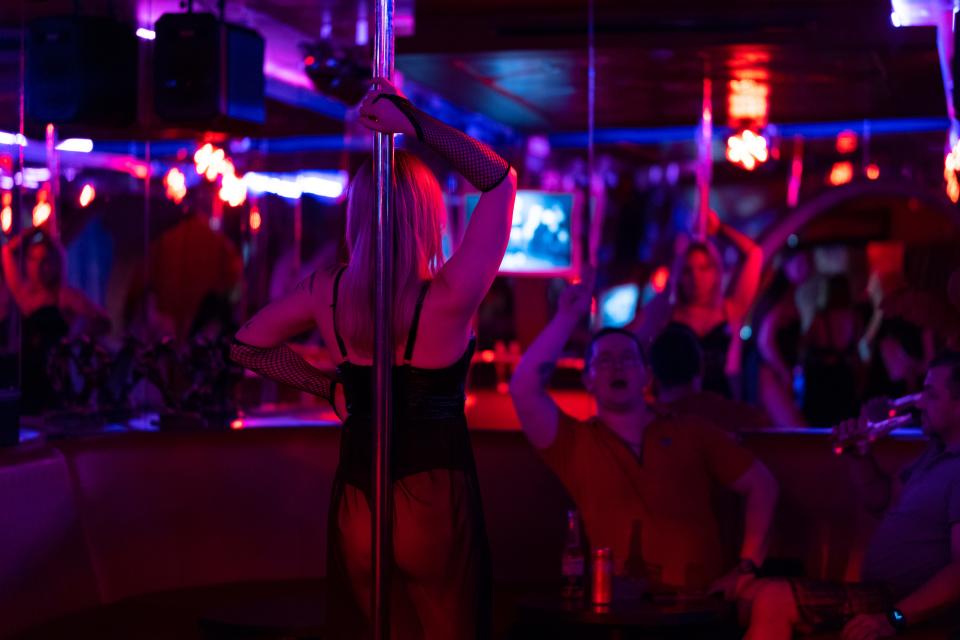
At 6 p.m. sharp, the Flash Dancers sign outside the club lights up. Kate, a 19-year-old host who's majoring in English at a nearby college, hands out flyers to passersby. She's wearing a long red dress, red wings, and a red masquerade mask. No one bites. Inside, the dancers chat before the dance floor's mirror.
The International Monetary Fund says the Ukrainian economy has begun to show signs of "remarkable resilience" as critical infrastructure has been restored and inflation has begun to come down. And though Ukrainians have little spending power, nightlife is resurgent. In Kyiv, according to some reports, there are now more bars and restaurants open than there were before the war. Still, fewer than half of all small businesses in Ukraine are operating at full capacity, and inflation remains punishingly high. "Prices are constantly going up even now. It's scary," Kseniya says. She fears that if rates continue to climb, "people will stop going."
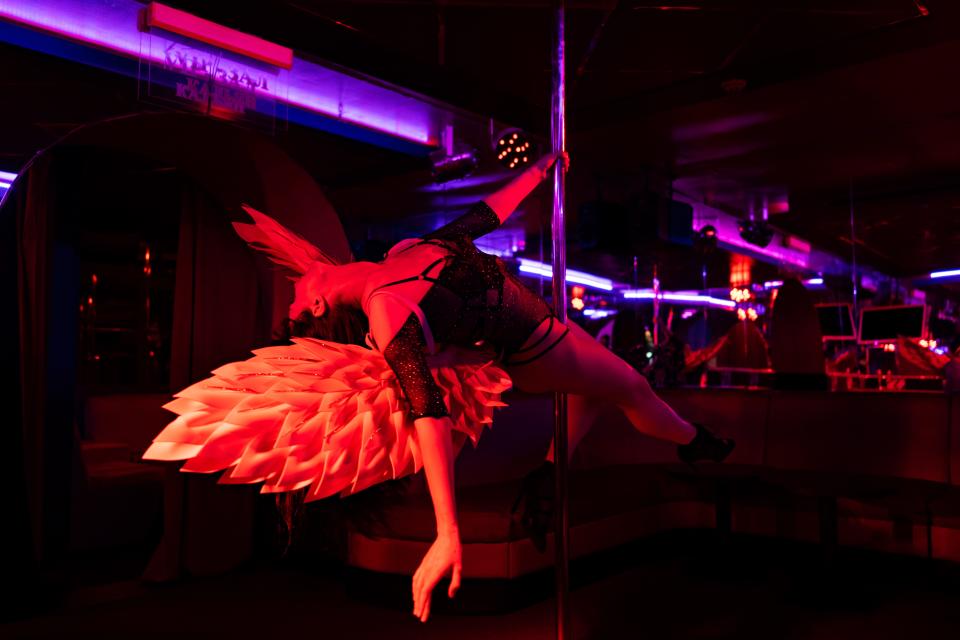
The evening at Flash Dancers could serve as a microcosm of Ukraine's tentative but determined return to normality. By 7, two men trundle down the red-carpeted staircase. As more trickle in, some women take turns dancing while others sit with them, offering them company as they watch the performers. At 9 p.m., just after sunset and with barely an hour before close, a large group arrives. In the final hour, there's an avalanche of constant, acrobatic motion around the pole — syncrhonrized spins and shimmies and sashays as Aguilera croons. When one dancer finishes onstage, another immediately replaces her. "We've sped up the relaxation process" for the customer, Valeriya says, by "distracting him with a beautiful fuss around him."
"We reopened the club to create another world, where everything is magical," Valeriya says. "Diamonds and rhinestones do the trick."
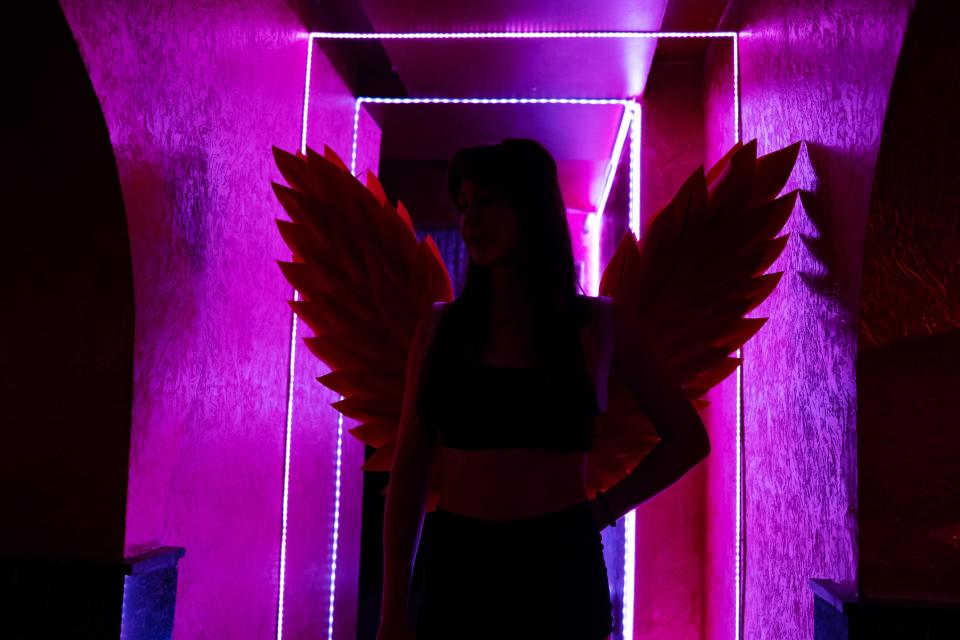
Anna Conkling is a journalist based in Berlin. Her writing has been featured in Rolling Stone, Elle, The Daily Beast, and elsewhere.
Read the original article on Business Insider

